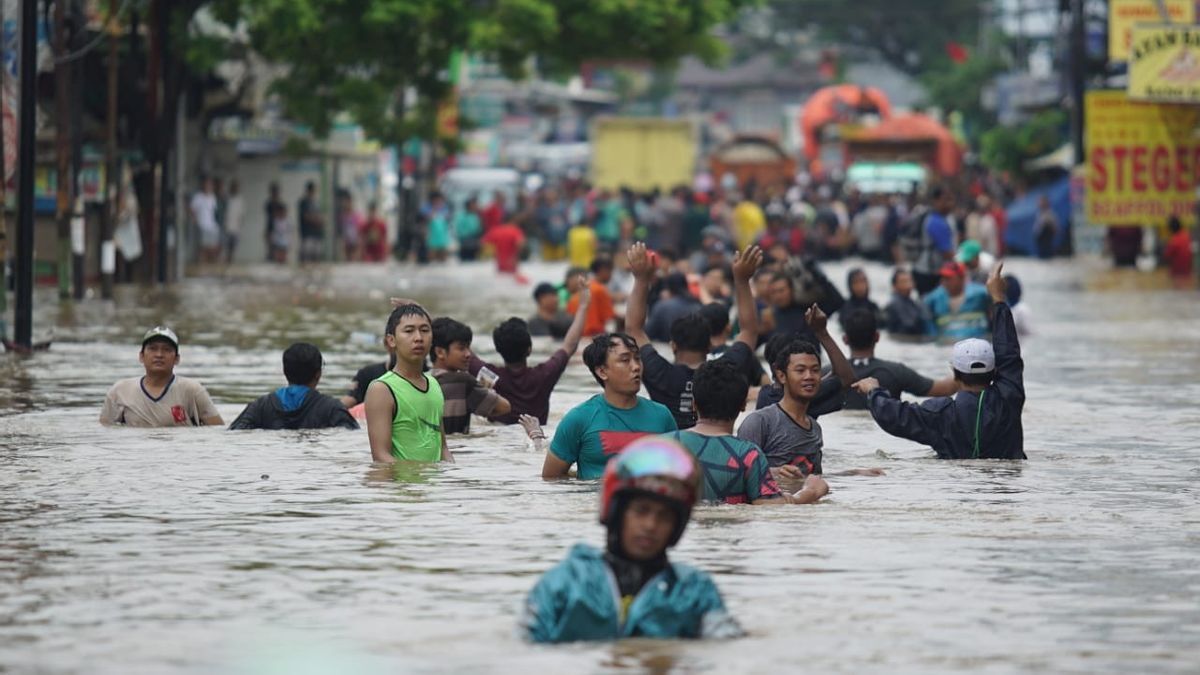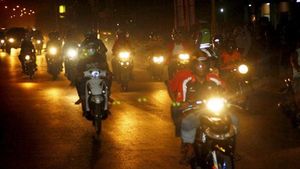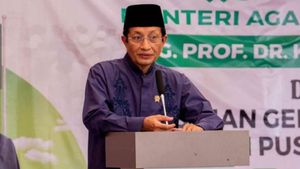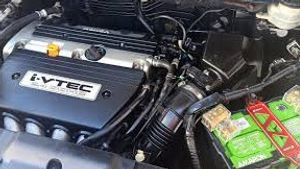JAKARTA - The DKI Regional Disaster Management Agency (BPBD) has issued an early warning against the potential for heavy rain which can be accompanied by lightning, and strong winds during the next week.
"DKI Jakarta is included in the potential impact with alert status. Extreme weather conditions like this can cause puddles, floods, landslides, fallen trees, and slippery roads", said The Chief Executive of the DKI Jakarta Provincial BPBD, Sabdo Kurnianto, Thursday, January 28.
The Meteorology, Climatology and Geophysics Agency (BMKG) predicts that the peak of the rainy season will occur in January and February 2021 in DKI Jakarta. BMKG also warned against high waves with a height of 1.25 to 2.5 meters in the Thousand Islands.
In the face of bad weather and hydrometeorological disasters at the beginning of the year, Secretary of the Water Resources (SDA) Dudi Gardesi said that the DKI Provincial Government has five programs to anticipate the impact of flooding.
"There are at least five programs that have been carried out, namely Gerebek Lumpur, vertical drainage (infiltration wells), pump maintenance, tidal flood handling through NCICD, and polder system management", said Dudi.
Gerebek Lumpur, said Dudi, is the dredging or draining of mud from rivers and reservoirs. Thus, the water capacity in the rainy season is maximized.
In 2020, 23 reservoirs have been dredged, with a dredging volume of 446,402.9 m3. Then, for river dredging, a total of 93 locations, with a dredging volume of 279,967.5 m3. Meanwhile, 390 channels have been dredged, with a dredging volume of 121,002.6 m3.
However, Dudi admitted that the Gerebek Lumpur program had not been completed. This is because Dudi likens the river dredging to cutting grass on the highway. He said, when rivers or reservoirs are dredged, the mud will settle back.
"If you calculate when it will be finished, this is a job like mowing grass on the highway. If we start cutting at kilometer 0 and finish at kilometer 60, the grass at kilometer 0 will have grown again. Dredging is like that in a cycle", said Dudi.
The next program is vertical drainage or infiltration wells. As of December 31, 2020, there have been 2,974 infiltration wells in 777 locations, such as in Child-Friendly Integrated Public Space (RPTRA), Regional Government Buildings, Schools, City Parks, and Mosques. However, the infiltration wells that were built until the end of 2020 have not reached the target of 5,000 points.
Then, for the handling of tidal floods through NCICD, the DKI Jakarta Natural Resources (SDA) Office has determined the priority locations for the construction of coastal embankments, namely Kamal Muara, Blencong River, Kali Adem-Muara Angke, Muara Beach, Sunda Kelapa, and Tanjung Priok.
Furthermore, the DKI Provincial Government will build and rehabilitate the polder during 2021-2022. The areas are in Kelapa Gading, Pulo Gadung, Cakung-Cilincing, Makassar, Cipayung, Penjaringan, Pademangan, and Kembangan-Kedoya.
In addition, Dudi admitted that his party continues to maintain pumps. Currently, there are 487 stationary pumps in 178 locations, as well as 175 mobile pumps in 5 regions.
Prepare flood evacuation
The Chief Executive of the DKI Regional Disaster Management Agency (BPBD), Sabdo Kurnianto, said that the DKI Provincial Government has prepared flood evacuation tents during the rainy season.
Sabdo said if a flood occurs and residents are forced to evacuate, the tent will be built. Later, the refugee tents for the general public will be separated from vulnerable groups and people suspected of exposing COVID-19.
"We have determined the layout for the placement of refugee tents with the COVID-19 health protocol, namely separating the general refugee tents, tents for vulnerable groups such as pregnant women and the elderly, and tents for close contact/suspected COVID-19", said Sabdo.
Sabdo said that the DKI Jakarta Provincial Government will also conduct a rapid antigen test for residents who are about to flee due to flooding. Screening measures for flood refugees in the rainy season during the pandemic are carried out to prevent transmission of COVID-19.
"During the COVID-19 pandemic, we must continue to apply health protocols. So, the problem of rapid antigen is a part that can be done and God willing, we are ready for our own goods", he said.
If the test result is negative, residents can go directly to the evacuation site. Meanwhile, if there are test results that test positive for COVID-19, it will be followed by a PCR test. Then, they will be referred to the referral hospital or isolation area provided by the DKI Provincial Government.
The English, Chinese, Japanese, Arabic, and French versions are automatically generated by the AI. So there may still be inaccuracies in translating, please always see Indonesian as our main language. (system supported by DigitalSiber.id)













